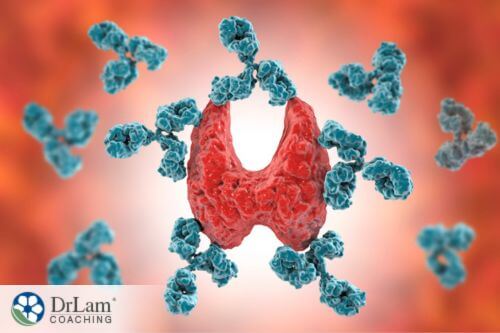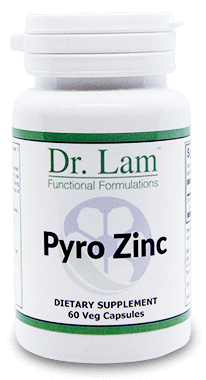 Hashimoto’s is one of the most common thyroid diseases on the planet, affecting up to 14 million people in the US. While this condition is undesirable in many regards, one of the biggest concerns is the increased weight with Hashimoto’s. Trying to lose weight can be challenging in even the best of circumstances, and it is even more difficult with a condition like Hashimoto’s. But why is weight gain associated with this condition, and what is the best way to deal with it? Let’s find out.
Hashimoto’s is one of the most common thyroid diseases on the planet, affecting up to 14 million people in the US. While this condition is undesirable in many regards, one of the biggest concerns is the increased weight with Hashimoto’s. Trying to lose weight can be challenging in even the best of circumstances, and it is even more difficult with a condition like Hashimoto’s. But why is weight gain associated with this condition, and what is the best way to deal with it? Let’s find out.
Hashimoto’s thyroiditis, or Hashimoto’s disease, is an autoimmune condition where the body’s white blood cells attack the thyroid gland. When the integrity of the thyroid gland is compromised and Hashimoto’s results, there is a subsequent reduction in thyroid hormone production. This is known as hypothyroidism.
There are many symptoms of hypothyroidism, including fatigue, dry skin, muscle pain, hormone changes, and hair loss, but one of the most troublesome for many people is weight gain. For most people, there is a gain of about five to ten pounds. However, depending on certain risk factors, the weight gain could be much more than ten pounds. If you are female or have significantly depleted thyroid levels, you are at higher risk of greater weight gain.
Worse, increased weight with Hashimoto’s doesn’t respond to many of the conventional weight loss practices. For instance, many experts have noted that exercise and even a calorie deficit can do more harm than good in Hashimoto’s.
If this increase in weight with Hashimoto’s is unchecked, it could pose a physical health risk and affect your mental health as well. This can then make it even trickier to lose weight. As such, weight gain with Hashimoto’s should not be overlooked or underestimated.
Research has identified multiple causes of the increase in weight with Hashimoto’s.
Reduced thyroid function is the most likely cause of weight gain with Hashimoto’s. This is because the thyroid gland produces hormones that play a huge role in controlling the body’s metabolism.
An important marker of metabolism in the body is the basal metabolic rate (BMR), which is the number of calories the body burns to perform basic life-sustaining processes. This includes thinking, breathing, and eating. The basal metabolic rate can simply be described as the number of calories the body burns in a resting state, which explains why it is also called the resting metabolic rate (RMR).
Since Hashimoto’s affects the thyroid gland and, consequently, thyroid function, metabolism reduces in the body. If metabolism reduces, the body burns fewer calories, which precedes weight gain.
Hashimoto’s is an autoimmune condition, and studies have drawn strong links between autoimmune diseases and inflammation. The more inflammation in the body, the greater the risk of developing Hashimoto’s, which then increases the risk of weight gain.
Aside from this rather direct link, inflammation can also cause an increase in weight with Hashimoto’s by its influence on essential fat-regulating hormones – insulin and leptin. Insulin is a hormone that helps regulate blood sugar levels by facilitating the entry of glucose into body cells. On the other hand, leptin helps maintain the body’s normal weight by regulating hunger and promoting a feeling of fullness to prevent overeating.
When there’s chronic inflammation in the body, there is increased resistance to the effects of insulin and leptin. This translates to an increase in weight with Hashimoto’s.
 The thyroid gland also affects the levels of sex hormones, like estrogen and progesterone, in the body. When there is a problem with the thyroid gland, resulting in either hyperthyroidism or hypothyroidism (as with Hashimoto’s), the levels of sex hormones in the body change. Whether they increase or decrease depends on several factors.
The thyroid gland also affects the levels of sex hormones, like estrogen and progesterone, in the body. When there is a problem with the thyroid gland, resulting in either hyperthyroidism or hypothyroidism (as with Hashimoto’s), the levels of sex hormones in the body change. Whether they increase or decrease depends on several factors.
However, the influence of sex hormones on fat cells and weight gain has been well-documented in various studies. This means that a condition that can alter the levels of circulating sex hormones can lead to weight changes. In the case of Hashimoto’s, the weight typically increases.
One of the primary risk factors of an underactive thyroid is stress. When there is chronic stress in the body, physical fatigue may result. This can make it challenging for an individual with Hashimoto’s to maintain an active lifestyle.
Another dimension of stress that could result in weight gain is adrenal fatigue. There is actually a connection between the adrenal and thyroid glands, and this is typified by alterations in cortisol, moving the thyroid into a more inactive state. In view of this, a condition that can cause reduced adrenal gland functioning can increase the risk of Hashimoto’s. One such condition is Adrenal Fatigue Syndrome (AFS).
Adrenal fatigue is a condition where the body’s stress response cannot keep up with chronic stressors. This condition (AFS) is possibly the most common cause of secondary low thyroid function clinically and sub-clinically. This makes sense, too, when you consider that the NeuroEndoMetabolic (NEM) Stress Response plays a vital role in managing stress in the thyroid glands.
The NEM is the body’s in-built stress-coping system, and it consists of six circuits of related organs. One of these circuits is the hormone circuit, which consists of the thyroid gland, adrenal gland, and gonads. Any dysfunction with this circuit will correlate to a loss in thyroid function; if this persists, adrenal fatigue could develop.
When an individual has Hashimoto’s, their mental health may take a hit. This could cause conditions like depression and anxiety to develop. The individual may also be in a state of perpetual stress, further affecting their mental health. Common symptoms of mental health conditions are mood changes, impaired judgment, appetite irregularities, and even binge eating.
Factoring in all the symptoms of mental health conditions, individuals with Hashimoto’s might find themselves stress-eating and consuming more junk foods. Mood can also impact dietary choices and make it more difficult to lose weight with Hashimoto’s.
The common advice is that maintaining a calorie deficit is the best way to lose weight. However, it gets a little tricky when trying to lose weight with Hashimoto’s. This is because your body may adjust to decreased calorie intake by further reducing metabolism. Since the basal metabolic rate is already low, the impact of additional reductions in metabolism can be severe.
Therefore, the best way to lose weight with Hashimoto’s is a combination of lifestyle and dietary changes. Also, steps that can increase thyroid function, including medications and supplements, should be adopted.
While you can still exercise when trying to lose weight with Hashimoto’s, you should be mindful of the kinds of exercise you do. Consider high-intensity interval training (HIIT) and be sure to get adequate rest.
 Fatigue is one of the most typical experiences with Hashimoto’s disease. In addition to fatigue, you may experience muscle and joint pain. If this fatigue is left unchecked, the risk of gaining weight with Hashimoto’s could increase even further as you become too tired for physical activity.
Fatigue is one of the most typical experiences with Hashimoto’s disease. In addition to fatigue, you may experience muscle and joint pain. If this fatigue is left unchecked, the risk of gaining weight with Hashimoto’s could increase even further as you become too tired for physical activity.
Fortunately, there are several ways to deal with fatigue with Hashimoto’s:
Perhaps the most often recommended method of losing weight with Hashimoto’s is dietary changes. Diet does play a role in not only exacerbating weight gain with Hashimoto’s but also worsening other health conditions.
Below are a few diet plans that may help you lose weight with Hashimoto’s.
This diet consists only of foods that were available in the Paleolithic era more than two million years ago. The paleo diet does not include foods that became more common when small-scale farming began. This diet aims to eliminate foods that can cause or worsen inflammation in the body. Since Hashimoto’s is an autoimmune disease that can be easily affected by inflammation, this diet is often recommended.
To practice the paleo diet, you should focus on the following foods:
Similarly, you should avoid refined and processed foods, alcohol, sugar, dairy, grains, and other foods that can cause inflammation.
Also called the autoimmune paleo diet, the AIP diet is an elimination diet that aims to reduce inflammation and other symptoms of autoimmune conditions. The AIP diet can be described as a much stricter form of the paleo diet, eliminating even more foods from the typical Paleo diet. Aside from excluding inflammatory foods, this diet also incorporates anti-inflammatory foods.
To practice the AIP diet, you would focus on eating the following foods:
You should avoid the following foods under the AIP diet:
Probiotics and fermented foods are foods that contain “good gut bacteria,” which are microorganisms that help to balance the microbial flora of the gut and also help ferment fiber. These probiotics have been found to support the immune system, reducing the risk of chronic inflammation. Also, probiotics can help reduce blood sugar levels and suppress hunger signals, which can help you lose weight with Hashimoto’s.
However, before incorporating new probiotics into your diet, ensure you speak to your healthcare provider, especially if you have had a history of gut-related conditions.
Eliminating foods that can cause inflammation from your diet is not always enough when trying to lose weight with Hashimoto’s. Also, people with Hashimoto’s may lack nutrients and essential minerals that can improve thyroid function. Supplements can fill these gaps, and below are some of the best ones to consider.
 This mineral helps the body produce thyroid hormones, improving thyroid function. When zinc is deficient, the risk of hypothyroidism drastically increases.
This mineral helps the body produce thyroid hormones, improving thyroid function. When zinc is deficient, the risk of hypothyroidism drastically increases.
Studies show that taking 30 mg of zinc a day can lead to better thyroid function for people with hypothyroidism. But even 11 mg per day for men and 8 mg for women has been shown to give encouraging results. Zinc can be taken as a supplement alone or in combination with selenium.
Most of the selenium found in the human body is in the thyroid, and this element is essential in thyroid function and iodine recycling in the body. For people with Hashimoto’s, 200 mcg of selenium daily, either alone or with zinc, can help improve thyroid function.
This mineral is essential in maintaining thyroid function and also preventing autoimmune conditions like Hashimoto’s. Researchers have also found that iodine can be beneficial for weight loss among people with thyroid disorders.
This compound is anti-inflammatory, implying that it can help in the fight against autoimmune conditions like Hashimoto’s.
Hashimoto’s is a condition that reduces thyroid function, which can cause a reduction in basal metabolic rate, and ultimately lead to weight gain. However, for many people, this increase in weight with Hashimoto’s can be avoided and managed with the right diet, supplements, and lifestyle changes. Just be sure to talk to your healthcare practitioner before taking supplements for Hashimoto’s.
For more information about losing weight with Hashimoto’s, the team at Dr. Lam Coaching can help. We offer a free, no-obligation phone consultation at +1 (626) 571-1234 where we will privately discuss your symptoms and various options. You can also send us a question through our Ask The Doctor system by clicking here.

Boost weight loss goals with Pyro Zinc!
Exercise can help lose weight with Hashimoto’s, but only when done right. High-intensity interval training (HIIT) exercise is the recommended form of exercise for this condition. It is also essential to combine exercise with other lifestyle changes, like quality and sufficient rest